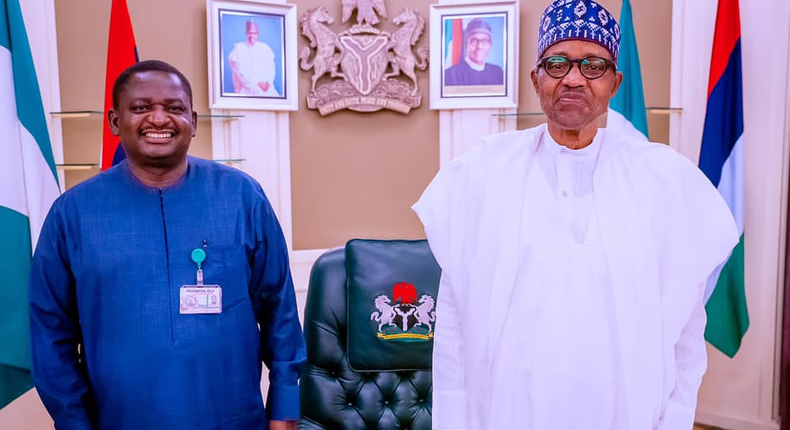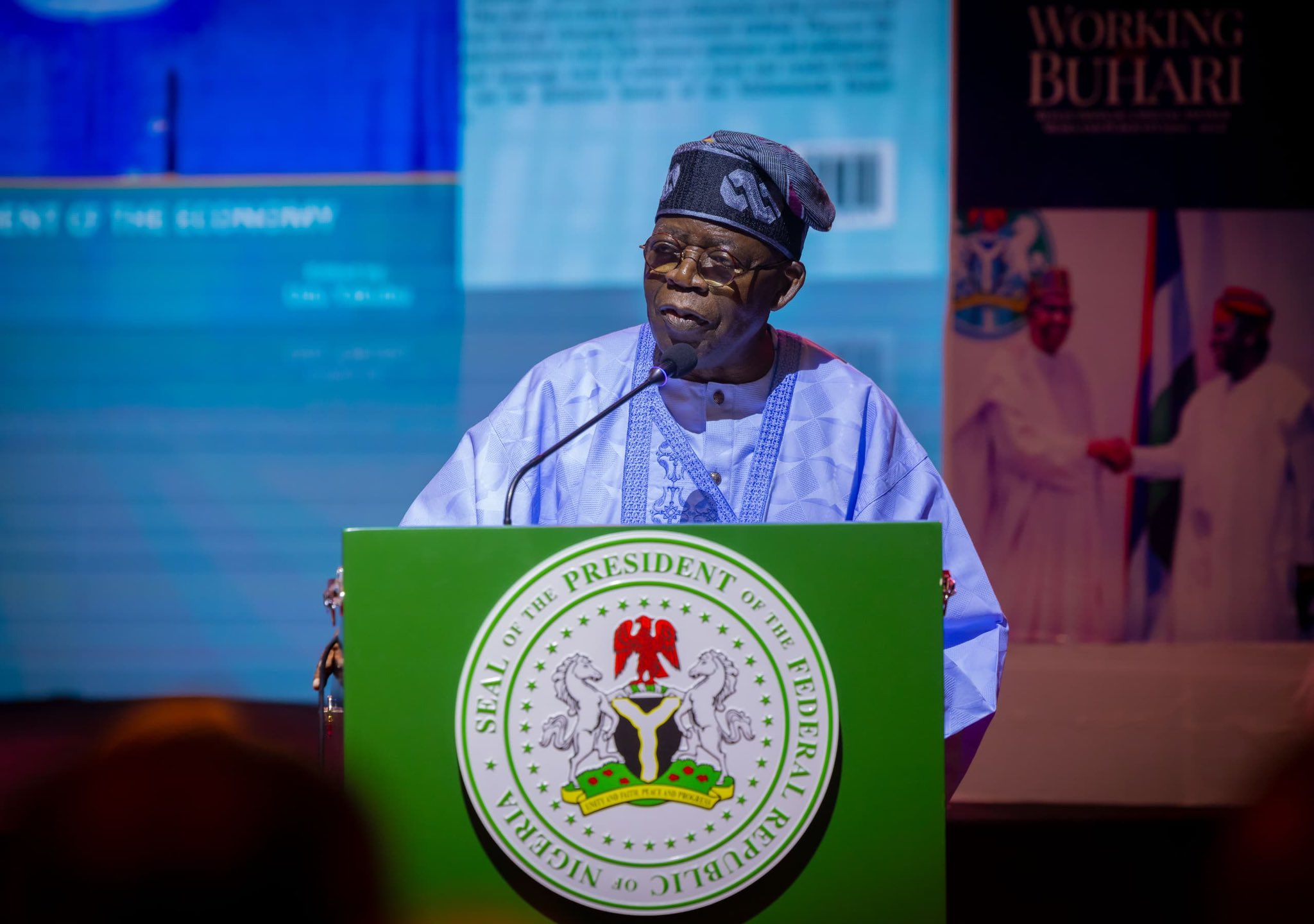BY CHIMA NMAESOMA
The recent launch of Femi Adesina’s book on his years while serving as spokesman to former President Muhammadu Buhari has opened a new window for members of the public to view both Buhari as a president and the administration he led.
One must commend Adesina that in just over seven months after leaving office, he has added a book to the bundle of literature on the presidency of our great nation. He has contributed to documenting history. This is a good move which should be recommended to others who have occupied sensitive offices.
While I was waiting to read the whole book, a friend of mine who is faster in devouring such contemporary historical collections sent me a screenshot of three paragraphs in the book that related to how Buhari reacted after the emergence of the leadership of both chambers of the national assembly on June 9, 2015.
Advertisement
Adesina recounted how he had met his boss and advised him on the need to issue a press statement on the emergence of the new leadership of the national assembly. He stated that the man refused but grudgingly and reluctantly conceded only when reminded that he had said he would work with whoever emerged among the contestants as presiding officers in both chambers of the federal legislature.
According to Adesina, when he wrote in the draft statement that “the constitutional process (leading to the election of the presiding officers) had been concluded”, the then President added the word “somewhat”. While I intend to read the entire book, that narration, to me, represented a summary and the essence of the Buhari personae as well as his tendency as a leader. He was and remains a dictator who only exploited a democratic system to be elected as a leader.
Buhari, as suggested in that particular encounter with Adesina under reference, is merely a dictator who has no respect for due process. He was a president who had no regard for the separation of powers and checks and balances that are key elements of a presidential and constitutional system of government as we operate in Nigeria.
Advertisement
Buhari knew that the legislature was a different, autonomous, and independent arm of government created by the constitution with its separate, deliberate, and distinctive rules, ethics, and procedure. The constitution has stipulated how the leadership of the national assembly should emerge. It has also set out how the legislature should set internal rules on how to evolve its leadership. In all these, no role was given to the presidency. Unlike in the parliamentary or cabinet system of government, even the political parties have no role.
The individuals that are assigned roles in the election of the senate president, speaker and their deputies are elected members of the legislature who would gather at the appointed time and in the chambers inside the parliament to perform that role. The President is only expected to issue a proclamation enabling the inauguration. Buhari proclaimed the inauguration of the 8th Senate and directed that it should be held at 10 am on June 9, 2015. The event was held accordingly and complied with all constitutional, legal, ethical, and procedural processes.
Yet, he was holding grudges that because his choice candidate did not emerge, what happened was “somewhat” in compliance with the constitutional process. Thus, his ego had to be massaged and his psyche had to be romanced before he could agree that a press statement should be issued by his office to acknowledge the new leadership.
What this disclosure has also revealed is that Buhari had made up his mind from day one that he would not work with the 8th National Assembly because his choice of leadership did not emerge. So, whatever that National Assembly did, Buhari out of his ego was set in his mind not to co-operate with them. He had a pre-determined plan to frustrate the legislature. And that was the mindset of a man who placed his ego well above the interest of the country. The country suffered a loss from this parochial and narrow view of the head of a diversified and multi-ethnic country like Nigeria.
Advertisement
Now we know it was not the National Assembly under Saraki that was hostile to the president. The President was determined to distance his presidency from the legislature that was not headed by his choice leaders.
It meant that this dictator would not have accepted the results of the elections if he had been declared the loser in the 2019 polls. He was a man who was hell-bent on having a castrated legislature. The sad aspect of this story is that with all the powers he acquired including that of having a pliable legislature as it was under the 9th National Assembly, he did not develop the country. The country was run aground with serious examples of poor governance. The Buhari administration was a sad story in the history of Nigeria.
It was obvious Femi Adesina was very nice in presenting some of the stories to protect his boss to whom he is understandably loyal.
Even then, the public should from that narrative by Adesina note the duplicity, insincerity, and double-speaking nature of Buhari as a man and a leader. This same man whose fortune had smiled on to become President after failing three times and after others worked so hard, sacrificed so heavily, and invested their resources unreservedly to make him realise his long-nurtured ambition had forgotten that if his predecessor, former President Goodluck Jonathan had not behaved as a genuine democrat and accepted the unpleasant verdict of the people, Buhari would not have been in a position to be dictating who would lead the National Assembly.
Advertisement
Does Buhari not know that Jonathan could also have said he (Buhari) was just “somewhat” declared winner of the 2015 election? After all, there were people in the then President’s party who believed certain funny things happened in the results returned in Kano state and some other parts of the North to give Buhari that electoral edge.
Before the National Assembly leadership elections, Buhari kept on assuring everybody that he was comfortable with whoever emerged among the two contestants for the office of Senate President and the duo seeking the office of Speaker. He said he would not interfere.
Advertisement
However, it was clear to some of the then legislators-elect that he was only making an outward show and grandstanding. He had his preference. He kept on deceiving the Saraki Group that with the key role that Saraki played in his own (Buhari’s) election, he had nothing against him if he was elected as Senate President. Meanwhile, he was surreptitiously working for the emergence of Ahmed Lawan. Well, he was entitled to his choice except that he should be honest enough to boldly proclaim that choice and let whoever prevailed eventually function in peace.
Lawan failed because, in the usual style of Buhari, he would never openly stand by, defend and project his choice. He would always try to pretend to be an uninterested, neutral party. Those who know him well usually will refuse to back down and vigorously pursue their ambition irrespective of where he stands.
Advertisement
This duplicity of the dictator that Buhari is, was also exploited by incumbent President Bola Ahmed Tinubu on his way to emerging as presidential candidate of the All Progressives Congress (APC) in 2022. It is a known secret that while Buhari wanted the same Ahmed Lawan to become the presidential candidate of APC, he was giving a false impression to Tinubu, Vice President Yemi Osinbajo, and Rotimi Amaechi, among others that he was neutral and that any of them would make a good successor to him.
It should be known that acting this Janus-face script is a dissembling act that dictators use to wear out their opponents and force their wishes on the people. It is just that Buhari is a weak, manipulative dictator. He does not stand up for and vociferously pursue his interests.
Advertisement
The scenario Adesina described about his boss’ reluctance to issue a press statement to comment on the emergence of the then National Assembly explained why in his eight years as president, Buhari treated the National Assembly with contempt and continuously undermined the institution. Under him, the National Assembly’s mace was stolen and the perpetrators were officially protected and even elevated. Under his regime, the National Assembly was invaded by heavily armed, hooded, and combat-ready security agents. On both occasions, Buhari kept mute and adopted his “I won’t say anything” stance.
With him as president, the National Assembly between 2019 and 2023 became a rubber-stamp legislature where anything the executive wanted passed. Of course, this happened under his beloved, preferred senate president, Lawan. Buhari watched indignantly and without any care as his ministers and other heads of MDAs would refuse with impunity to appear before the National Assembly to defend their budget proposal answer to invitations or defend their positions on issues. Under him, requests for loans were sent to the National Assembly without relevant documents and proper explanatory notes. He (Buhari) spent money with anticipatory approval, a gross violation of the laws on public spending.
Buhari, as president, made it possible for heads of MDAs who according to the enabling law must get senate confirmation or successfully pass through nomination screening to end up serving their full terms of office in an acting capacity because they have not passed the screening test and the president wanted them to circumvent the nomination process as stipulated by law,
These among others are some of the institutional damages that a dictator who sneaked through the democratic process to emerge as Nigeria’s fifth elected president wreaked on our country. Well, the jury is still out on the other aspects of Adesina’s book. Let us wait for their verdict.
One can only encourage more of his close aides to come out and write about their experiences. We believe more disclosure will still come out. We encourage others who worked closely with him also to write their accounts and give us more insight into the dictator’s mind and how he placed personal preference over the national interest. Unconsciously, more narratives will show the minds and hands of a dictator and how his huge ego and tendency to settle scores have led to rendering the country prostrate.
Nmaesoma writes from Owerri.
Views expressed by contributors are strictly personal and not of TheCable.
Add a comment






